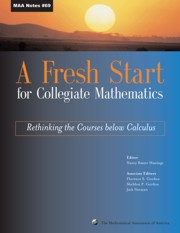Book contents
- Frontmatter
- Preface
- Contents
- Introduction
- Background
- Theme 1 New Visions for Introductory Collegiate Mathematics
- Theme 2 The Transition from High School to College
- Theme 3 The Needs of Other Disciplines
- 16 Fundamental Mathematics: Voices of the Partner Disciplines
- 17 Skills versus Concepts at West Point
- 18 Integrating Data Analysis into Precalculus Courses
- Theme 4 Student Learning and Research
- Theme 5 Implementation
- Theme 6 Influencing the Mathematics Community
- Ideas and Projects that Work: Part 1
- Ideas and Projects that Work: Part 2
17 - Skills versus Concepts at West Point
from Theme 3 - The Needs of Other Disciplines
- Frontmatter
- Preface
- Contents
- Introduction
- Background
- Theme 1 New Visions for Introductory Collegiate Mathematics
- Theme 2 The Transition from High School to College
- Theme 3 The Needs of Other Disciplines
- 16 Fundamental Mathematics: Voices of the Partner Disciplines
- 17 Skills versus Concepts at West Point
- 18 Integrating Data Analysis into Precalculus Courses
- Theme 4 Student Learning and Research
- Theme 5 Implementation
- Theme 6 Influencing the Mathematics Community
- Ideas and Projects that Work: Part 1
- Ideas and Projects that Work: Part 2
Summary
Introduction
In 1990 West Point adopted a bold, new curriculum that changed the mathematics courses that all students must take during the first two years. The senior leadership at West Point has always struggled with the issue of emphasis: skills or concepts. With the new curriculum, we were torn between teaching students to understand and use the tools of mathematics in solving real-world problems as opposed to mastering the skills (usually precalculus) that they had already learned. After many discussions with our partner disciplines, we came up with a compromise: the partners would concur on the needed skills, and the mathematics faculty would ensure that these essential skills were either internalized or memorized. The resulting accountability mechanism was a series of fundamental skills tests given throughout the first two years. Based on placement tests and observations of students' work done in class, the precalculus skills on entry to West Point are usually disappointing and at different levels. So, in consultation with our partner disciplines, the department of mathematics established and published for students and faculty the minimal math skills standards. To hold the students accountable, they must achieve an 80% or better on a gateway exam before being allowed to move on to the second course in the mathematics program, a prerequisite for physics and all of the engineering courses. Because of the involvement of many different faculty, this program has now been in place for ten years.
- Type
- Chapter
- Information
- A Fresh Start for Collegiate MathematicsRethinking the Courses below Calculus, pp. 160 - 168Publisher: Mathematical Association of AmericaPrint publication year: 2006

